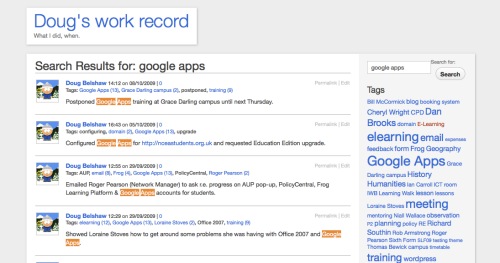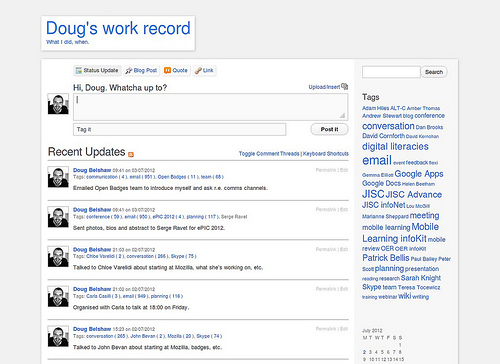Back in 2009 when I was Director of e-Learning of The Northumberland Church of England Academy I started tracking my own activities.
Using a private WordPress-powered blog with the P2 theme, I quickly logged what I was up to, adding tags as I went. Below is the tag cloud after one month of using the system as a Senior Leader in an newly-minted Academy:

As you can see, the following tags were prevalent (I don’t think I included teaching in there for some reason!):
- Google Apps (I was responsible for deploying it across the 9-site Academy)
- Elearning (obviously)
- Meetings (lots and lots of these)
- Email (a necessary evil)
- Dan Brooks (an M.Ed. student from an Australian university whom I mentored during extended teaching practice)
- Training (I led plenty of sessions)

The above screenshot is from yesterday, soon after finishing my two-year stint as Researcher/Analyst at JISC infoNet. Apart from changing my avatar and tweaking the colour scheme, what’s changed?
- The email tag is much larger in this cloud. I was working in an office rather than a school, after all.
- JISC, JISC Advance and JISC infoNet unsurprisingly figure a lot.
- Google Apps remains there as I implemented and supported the system for the 19 JISC Advance services.
- Mobile Learning infoKit is there as it was a major piece of work for me during my time at JISC infoNet.
- Digital literacies features due to my work in the area and programme support for the JISC Developing Digital Literacies programme.
- Patrick Bellis was my boss at JISC infoNet and Sarah Knight the JISC programme manager with whom I had the most dealings.
- Other people’s names feature as well – interestingly Dan Brooks (M.Ed. student at the Academy) is still there three years later. Just goes to show how intense that period was!
Finally, you can see that wiki and Skype are small but significant in the tag cloud. I’ve never worked for an organisation that had better knowledge management and procedures than JISC infoNet. The internal wiki had everything you needed to work effectively and was an active, living repository of information. Skype is used extensively throughout JISC, sometimes for calls, sometimes for ‘backchanneling’.
If you’d done something similar which tags would YOU expect to show up?

There’s something I’ve been bursting to tell people for the last few weeks. It’s something that will come as no surprise to some and a bit of a shock to others.
I’m joining the Mozilla Foundation.
I can’t tell you how excited I am! As ‘Badges and Skills Lead’ I’ll be both continuing the work started by Michelle Levesque on web literacies and evangelising Open Badges.
The last couple of years with JISC infoNet have been fantastic but I had to take such a wonderful opportunity! I’m fortunate to be both leaving and joining an extremely friendly, effective and forward-thinking team.
If you have any questions I’ll do my best to answer them in the comments below!
At the JISC infoNet quarterly planning meeting on Tuesday we got our Belbin feedback. For those who don’t know what that is (which would have included me until recently), go and read the Wikipedia article.
I’m not a huge fan of being pigeon-holed, but I found the results interesting nevertheless. I’ve only got a paper version of the results at the moment and, given it’s copyrighted material, I’m just going to share edited highlights. 🙂
There are nine defined roles with the Belbin process, the characteristics of which an individual is judged to exemplify to a greater or lesser extent. These are:
- Plant – Creative, imaginative, unorthodox. Solves difficult problems. Ignores incidentals. Too pre-occupied with own thoughts to communicate effectively.
- Resource Investigator – Extrovert, enthusiastic, communicative. Explores opportunities. Develops contacts. Over-optimistic. Can lose interest once initial enthusiasm has passed.
- Co-ordinator – Mature, confident. Clarifies goals. Brings other people together to promote team discussions. Can be seen as manipulative. Offloads personal work.
- Shaper – Challenging, dynamic, thrives on pressure. Has the drive and courage to overcome obstacles. Prone to provocation. Liable to offend others.
- Monitor Evaluator – Serious minded, strategic and discerning. Sees all options. Judges accurately. Can lack drive and ability to inspire others.
- Teamworker – Co-operative, mild, perceptive and diplomatic. Listens, builds, averts friction. Indecisive in crunch situations.
- Implementer – Disciplined, reliable, conservative in habits. A capacity for taking practical steps and actions. Somewhat inflexible. Slow to respond to new possibilities.
- Completer Finisher – Painstaking, conscientious, anxious. Searches out errors and omissions. Delivers on time. Inclined to worry unduly. Reluctant to let others into own job.
- Specialist – Single-minded, self-starting, dedicated. Provides knowledge and skills in rare supply. Contributes on only a limited front. Dwells on specialised personal interest.
For those who know me (either wholly through my work online or in person) I’d be interested in you participating in a little experiment:
If YOU had to choose three of these roles to describe me, which would you choose? Why?
(for a ‘Brucey bonus’ list some keywords you’d use to describe me)
I’ll share the keywords and roles my colleagues think fit me best in a forthcoming post. 😀



